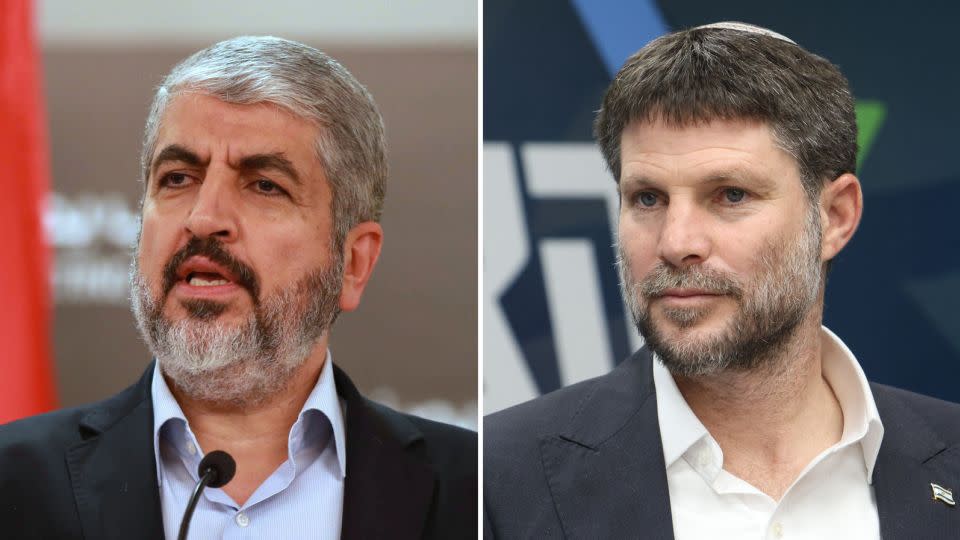Opinion: Psychology explains why the Israeli–Palestinian conflict is so intractable
- Oops!Something went wrong.Please try again later.
- Oops!Something went wrong.Please try again later.
Editor’s Note: Nafees Hamid is the research and policy director for King’s College London on the XCEPT research programme. He is a cognitive scientist who studies political violence. Follow his work on X @NafeesHamid, and @XCEPT_Research. The opinions expressed in this commentary are his own. See more opinion at CNN.
As fighting continues between Israel and Hamas, many may wonder why this war — and, more broadly, the decades-long Israeli–Palestinian conflict — is so intractable. As far as the current war is concerned, third parties like the UN, US and Qatar have had only minor tactical successes such as the brief hostage and prisoner exchange that prevailed at the end of November.

As for the longer conflict between Israelis and Palestinians, which has persisted since 1948, long-term peace today seems no closer than it did 75 years ago. Why is it so difficult to resolve this conflict? Why have so many peace efforts, pursued by so many governments and leaders over the decades, only led back to war?
The answer goes beyond geopolitics and speaks to the underlying psychology of what it is to be human and why we fight. Thankfully, the research on this psychology also points to potential pathways to resolution.
To be clear, geopolitics does matter: Power struggles among leaders, foreign actors’ cynical use of the Israeli–Palestinian conflict for their own domestic interests, economic motives, strategic and ideological alliances all have worked against peace. But these factors are influenced by and further influence deeper psychological impulses that exist across various conflicts but combine in vicious cycles in Israel and Palestine, leading to perpetual violence.
Here are key psychological concepts that have been studied in the Israeli–Palestinian context and what they mean for conflict resolution.
Parochial altruism: with us or against us
Humans have well-established in-group and out-group biases. These general tendencies still allow for us to be an extremely cooperative species, but the problem arises when these biases begin to polarize. Humans find trouble when they go to the extreme of altruism (by showing favoritism to one’s own group) while simultaneously going to the extreme of parochialism (by displaying hostility toward those outside it). When strong forms of parochial altruism arise on all sides of a conflict, intractability sets in.
It is believed that parochialism and altruism co-evolved in humans through repeated warfare. When another group threatens our existence, the best survival strategy is to bond as cohesively as possible with our in-group. This is oftentimes accompanied by perceiving one’s own group as morally superior or pure while overly villainizing or dehumanizing the other group. This creates a stark contrast between the good “us” and the evil “other.” This in turn justifies using excessive violence against the other side, including against their civilians. This can manifest in being cavalier about copious “collateral damage,” or even worse, in intentionally targeting civilians.

We can see this clearly in Hamas’ numerous terrorist attacks against civilians and their active dehumanization of Jews in their rhetoric and even in school books used to teach children. We can see it in Israel’s minister of defense bringing the entire 2.3 million population of Gaza to near starvation through a complete siege and justifying it by saying the Israel Defense Forces are “fighting human animals and we are acting accordingly,” or the now-suspended Israeli minister of Jerusalem affairs suggesting Israel could drop an atomic bomb on the Gaza Strip. The logic of the latter appears to be on a par with Hamas’: Our survival depends on the others’ annihilation.
Sacred values: never compromise
Of course, most Israelis and Palestinians don’t think like this. But there are myriad factors that make someone take on this hostile mode of thinking. Chief among those factors is a dogmatic ideology that makes compromise with the other side seem like a morally abhorrent notion.
This kind of ideology is infused with what are called “sacred values.” These are values of such moral importance that they transcend the material concerns of everyday life; people would be willing to give their lives for them. Israelis and Palestinians hold values that come into direct conflict with each other such as claims over land.
Within the bounds of modern-day Israel and the Palestinian territories are areas considered to be Holy Land by Abrahamic faiths. Wars have been fought on and off consistently over competing claims to its sanctity. Some are willing to accept its shared sacredness while others believe it belongs rightfully to their group alone. But a dispute over sacred land is not all about religion. It can and has been co-opted into politics, and that is from where much of the conflict emanates.
At one extreme end are Hamas, whose leader at the time, Khaled Meshaal, said in 2017 that “we shall not waive an inch of the Palestinian home soil.” On the other end is the Israeli minister of finance, Bezalel Smotrich, who just this July, in his dual role as head of the Defense Ministry’s Settlements Administration, laid out his plans for the annexation of the West Bank. In March, he spoke next to a map of “Greater Israel” that included parts of Jordan, while arguing against Palestinian statehood “because there’s no such thing as the Palestinian people” and because the Palestinian people are, in Smotrich’s words, an “invention.” When incompatible values like these become sacred, compromise becomes exceedingly difficult.
A feature of sacred values is that they cannot be traded-off with profane values like material incentives to compromise. This poses a serious issue for peace negotiations. When third parties (e.g., the UN, US, etc.) try to help negotiate peace deals, their main tools for (dis)incentivization are material in nature, such as foreign aid and sanctions. A study led from the New School for Social Research investigated how Israelis and Palestinians would react to a two-state solution deal. The sample included Jewish Israeli settlers and Palestinians who identified with Hamas.
Generally, both sides did not support the deal on offer. When each side was offered foreign aid to incentivize the deal, it produced a backfire effect among those who held sacred values. Those found by the researchers to be “moral absolutists” about particular issues — like Israel conceding land to Palestinians or allowing Palestinian refugees to return home — were more likely to experience anger and disgust at the deal and more likely to endorse violence against it when foreign aid was added to the mix. Meaning, adding foreign aid as an incentive to accept the deal only made things worse.
So how does one incentivize a peace deal among those who hold opposing sacred values? Luckily, there is an answer.
In the same study, the researchers tested the effect of symbolic concessions. These included things like Israel apologizing for the wrongs done to the Palestinian people for all these past years, and Palestinians recognizing the legitimacy of Jewish people’s right to the land of Israel. When a symbolic concession was offered, those holding sacred values were less angered and disgusted by the deal, and support for violent opposition plummeted.

Third-party mediators look at conflicts through the lens of business-style negotiations, where hard facts must be addressed when it comes to hostages, land, militarization, and so on. While these facts do need to be discussed, the research points to the importance of social-emotional needs being addressed first, as they underpin the unwillingness to compromise on the material issues. Carrot-and-stick policies, such as the promise of foreign aid coupled with the threat of sanctions, backfire when presented to those holding sacred values. By contrast, symbolic concessions flip this pattern and act as precursors to further pragmatic negotiations.
Trauma and victimhood: The past is never past
Collective trauma only makes resolving this conflict more difficult. For both sides, the current violence brings back traumatic memories. For Israelis, the attacks on October 7th — and events afterwards such as the storming of an airport in the Russian Republic of Dagestan, where a mob searched for Jewish passengers, or the October firebombing attack on a Berlin synagogue — reminds them of the pogroms Jews faced at the hands of the Nazis and others.
For Palestinians, the war driving people out of their homes and into the streets and refugee settlements harkens back to the Nakba in 1948, when Palestinians were left as a stateless people during the creation of Israel. Collective traumas become part of the story each group tells about itself. They can also be a barrier to resolution by causing some to resist compromise, in order to not let the past repeat itself.
This reaction can be amplified by something called competitive victimhood. As the name suggests, each side competes for who is the greater victim. The competition is not always explicit, but one can hear it as an element in the discussion of this current war. Israelis point out that they suffered an unprovoked attack that killed over 1,200 people and saw more than 240 hostages taken by Hamas into Gaza. Palestinians note that their victimization goes far back, through decades of subjugation.
Whether it’s acknowledged or not, this competition can lead to an infinite regress, where each side points to an earlier historical fact to demonstrate its greater victimhood and thereby entitlement to greater sympathy. In addition, denying each other’s collective traumas is tantamount to questioning each other’s collective identities and is experienced as re-victimization. This creates a dynamic where each side expects the other to make the first and greater concession, which often leads to a stalemate.
Researchers at Tel Aviv University conducted experimental surveys of Israelis and Palestinians and found that simply acknowledging each other’s traumas can reduce competitive victimhood and increase reconciliation. In these studies, Israeli Jews were presented with information about Palestinians acknowledging the Holocaust as a major victimizing event, while Palestinians were told about Israeli Jews acknowledging the suffering related to the Nakba. What the researchers found: Having one’s own collective trauma acknowledged increased willingness to acknowledge the other side’s traumas, thereby reducing competitive victimhood. Even more surprising, this reciprocal acknowledgment led to both sides being more willing to compromise on contentious issues like the partition of Jerusalem, Israeli West Bank settlements and Palestinian “right of return.”
The way forward: Thankfully, the tools exist
Depressing as the last three months have been, the psychological literature makes clear that tools do exist to make peace more possible. Symbolic concessions decrease barriers to resolution, even among absolutists. Acknowledging each other’s traumas reduces competitive victimhood and increases willingness to compromise on contentious issues. Those elements of dialogue are important for opening the door to discussion of any particular peace plan.
These tools can only be used if leaders on both sides agree to a cessation of violence and sincerely want peace. Such is not the case when war rages on and a group like Hamas identifies itself with the destruction of Israel, and a leader like Netanyahu indicates (as he did in 2019) that a strong Hamas is good for Israel as it provides justification for avoiding peace.
The research all points in one direction: the need to publicly and unequivocally accept each other’s realities and thereby dignify each other’s humanity. Once that happens, pragmatic negotiations related to material disputes can be undertaken. But until then, strong psychological levers will continue to work against peace.
For more CNN news and newsletters create an account at CNN.com

